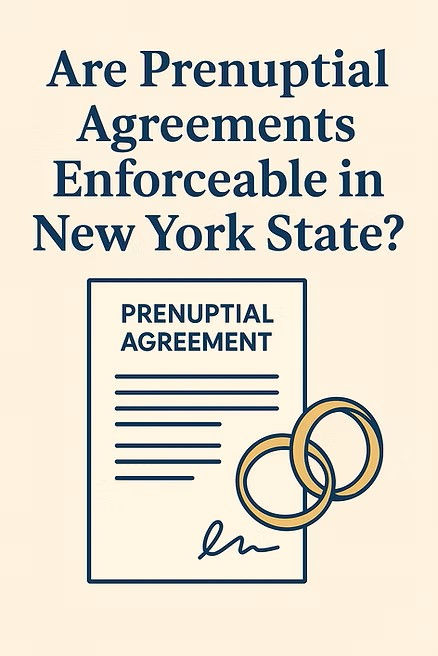Are Prenuptial Agreements Enforceable in New York State?
- Paul Tortora Jr.
- Nov 24, 2025
- 3 min read
Updated: Jan 12

Prenuptial agreements, commonly referred to as "prenups," represent legal contracts that couples enter into prior to marriage. These agreements delineate the division of assets, debts, and other financial matters in the event of divorce or death. For many individuals in New York, these agreements provide a sense of security and clarity during what can be an emotionally charged period. A frequently posed question is: Are prenuptial agreements enforceable in New York State? The concise answer is affirmative; they are generally enforceable, provided they adhere to specific legal requirements and are devoid of certain defects. In this post, a Syracuse prenup attorney will explore the key factors that determine enforceability in New York State.
Understanding Prenuptial Agreements in New York
New York law acknowledges prenuptial agreements as valid contracts. The legal framework emphasizes fairness and proper execution. Courts are inclined to uphold a prenup if it is created with transparency and mutual consent. However, they possess the discretion to invalidate agreements that do not align with public policy or equitable principles.
Prenups can encompass a broad spectrum of topics. These include property division, spousal support (alimony), and inheritance rights. However, it is crucial to note that they cannot dictate child custody or support arrangements. Such matters must always prioritize the child's best interests and are subject to court approval.
Key Requirements for Enforceability
For a prenuptial agreement to withstand scrutiny in a New York court, it must fulfill several formal and substantive criteria:
In Writing and Properly Executed: The agreement must be documented in writing; verbal prenups lack enforceability. Both parties are required to sign the document, and the signatures must be acknowledged by a notary public, akin to the formalities observed in a deed. This formal acknowledgment serves to prevent claims of forgery or misunderstanding.
Voluntary Agreement: Both spouses must enter into the prenup willingly, devoid of duress, coercion, or undue influence. For example, presenting the agreement mere days before the wedding could raise significant concerns regarding voluntariness.
Full Financial Disclosure: Transparency is paramount. Each party must fully disclose their assets, liabilities, and income. Concealing substantial wealth or debts may render the agreement fraudulent and, consequently, unenforceable.
Fairness and Conscionability: The terms of the agreement should not be so one-sided that they shock the conscience of the court. While New York does not mandate absolute equality, an agreement that leaves one spouse destitute could be invalidated on grounds of unconscionability.
If these elements are satisfied, New York courts will typically enforce the prenup as written, thereby respecting the couple's pre-marital intentions.
Common Grounds for Challenging a Prenup
Even a meticulously drafted prenup is not impervious to challenges. Disputes often arise during divorce proceedings, and courts may set aside an agreement under various circumstances:
Fraud or Misrepresentation: If one party has misrepresented their finances or the implications of the agreement.
Duress or Coercion: Instances where one spouse, family, or external circumstances exerted pressure that led to an unwilling signature.
Unconscionability: Terms that were inequitable at the time of signing or have become unfair due to altered circumstances.
Improper Execution: Situations involving a lack of notarization or failure to meet writing requirements.
Public Policy Violations: Provisions that encourage divorce or waive rights in a manner that imposes a burden on the state, such as leaving a spouse reliant on public assistance.
It is worth noting that each spouse should ideally have independent legal counsel to review the agreement. While this is not strictly mandated, the presence of separate attorneys can bolster the case for enforceability by demonstrating informed consent.
The Importance of Legal Guidance
Navigating the complexities of prenuptial agreements necessitates a thorough understanding of the legal landscape. The nuances of state law can significantly impact the enforceability of these agreements. Therefore, professional guidance is essential. A skilled attorney can assist in drafting an agreement that safeguards your interests while minimizing the potential for future disputes.
Contact a Syracuse Prenup Attorney Today
While prenuptial agreements are enforceable in New York when properly prepared, the intricacies of state law underscore the necessity of professional guidance. A proficient attorney can help draft an agreement that protects your interests while minimizing the risk of future challenges. Contact us today for a confidential consultation with a Syracuse prenup attorney to discuss your unique situation.
For more information on prenuptial agreements, please visit our Prenuptial Agreements in New York State and Frequently Asked Questions pages.
Disclaimer: This blog post is for informational purposes only and does not constitute legal advice. Laws and guidelines can change, so always verify with current statutes or a professional.


